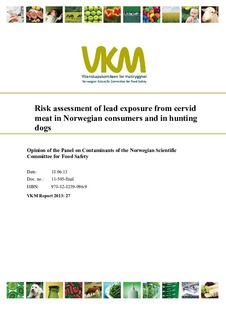Risk assessment of lead exposure from cervid meat in Norwegian consumers and in hunting dogs. Opinion of the Panel on Contaminants of the Norwegian Scientific Committee for Food Safety
Knutsen, Helle Katrine; Brantsæter, Anne Lise; Fæste, Christiane Kruse; Ruus, Anders; Thomsen, Cathrine; Amlund, Heidi; Arukwe, Augustine; Eriksen, Gunnar Sundstøl; Skåre, Janneche Utne
Research report
Published version
Permanent lenke
http://hdl.handle.net/11250/2463569Utgivelsesdato
2013Metadata
Vis full innførselSamlinger
Sammendrag
Lead is a naturally occurring heavy metal found in small amounts in the earth’s crust. Lead is also an environmental contaminant due to human activities. Humans and animals are exposed to lead through food, drinking water, air and dust. Lead is accumulating in the body and is known to be harmful to humans and animals. In 2010 and 2011, respectively, both the European Food Safety Authority (EFSA) and JECFA (WHO) have concluded that there is no evidence for a threshold for critical endpoints of lead exposure i.e. under which there is no increased risk of adverse health effects. Public authorities work to reduce the lead exposure in the population.
